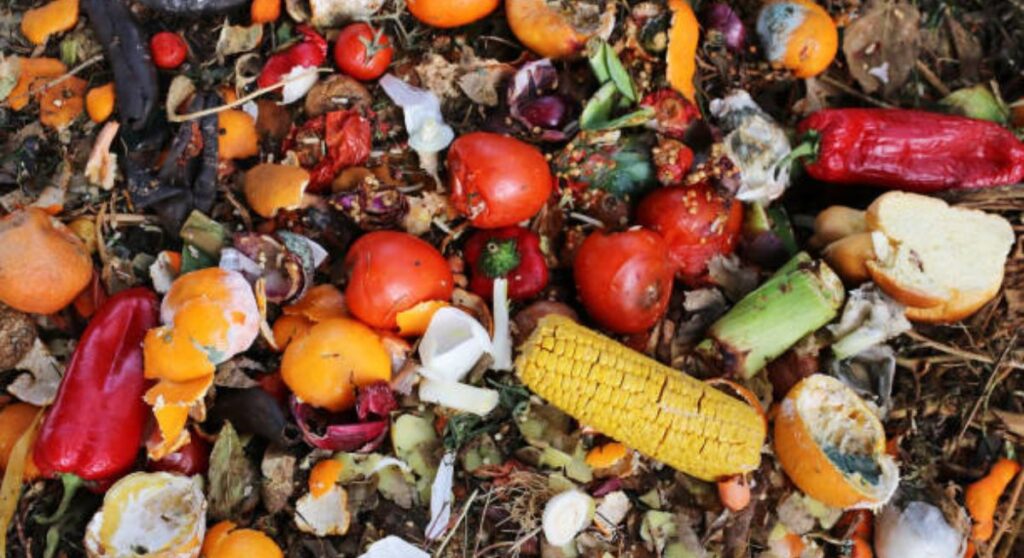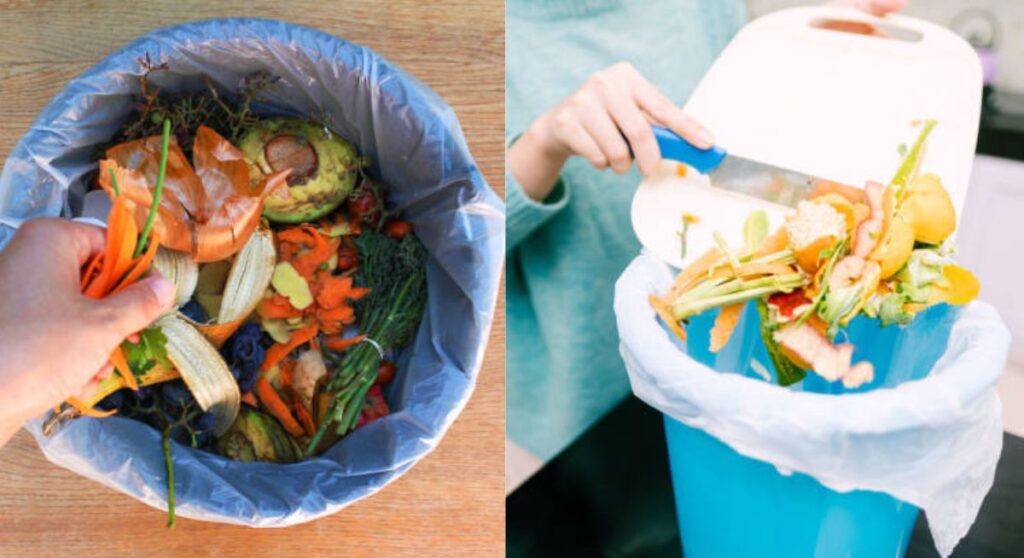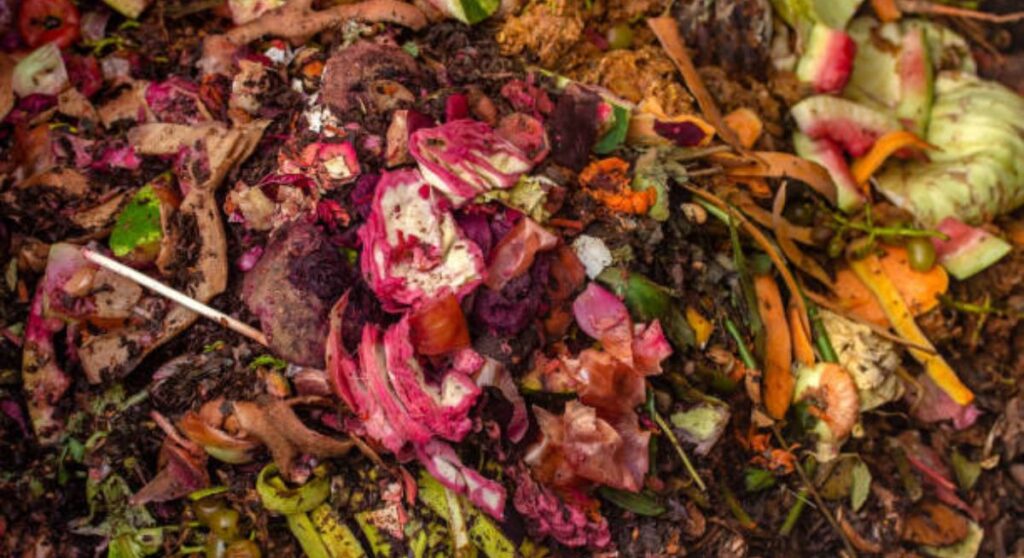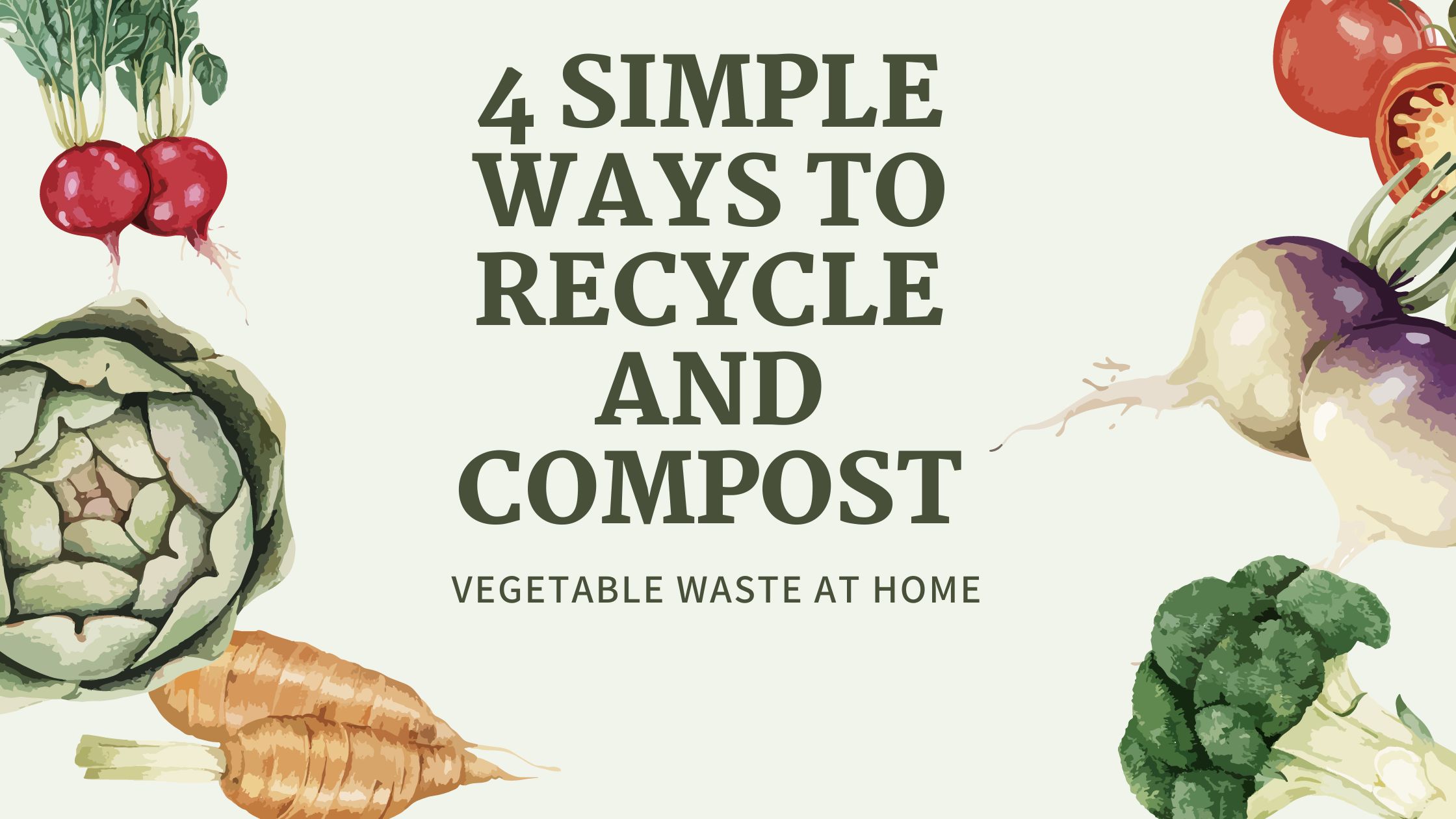Introduction:-
4 Simple Ways to Recycle and Compost Vegetable Waste at Home

In today’s world, reducing waste is more important than ever. One of the most effective ways to minimize your environmental footprint is by recycling and composting vegetable waste. Not only does it help reduce the amount of trash sent to landfills, but it also creates nutrient-rich compost that can enhance your garden’s soil..
Here are 4 simple ways to recycle and compost vegetable waste at home.
1. Set Up a Kitchen Compost Bin
The first step to composting vegetable waste starts in your kitchen. Setting up a small compost bin on your countertop or under the sink makes it easy to separate vegetable scraps like peels, cores, and unused bits. When selecting a compost bin, opt for one with a charcoal filter to prevent odors. Compost-friendly materials include:
- Fruit and vegetable scraps
- Coffee grounds and filters
- Tea bags (non-synthetic)
- Eggshells
Pro Tip: Avoid adding meat, dairy, or oily food scraps, as they can attract pests and slow down the composting process.
2. Start an Outdoor Compost Pile or Bin
Once your kitchen bin is full, transfer the contents to an outdoor compost pile or a composting bin. Choose a location in your yard that’s well-drained and gets a good amount of sunlight. The heat from the sun helps speed up the decomposition process.
To create the perfect compost, layer your vegetable waste with “brown” materials like leaves, straw, or shredded paper. This balance of green (nitrogen-rich) and brown (carbon-rich) materials is essential for breaking down the waste efficiently.
- Green materials: vegetable scraps, grass clippings
- Brown materials: dry leaves, twigs, cardboard
Pro Tip: Turn your compost pile every couple of weeks to aerate it, which speeds up decomposition and helps prevent odors.
3. Try Vermicomposting (Worm Composting)
For those with limited outdoor space, vermicomposting is an excellent alternative. Vermicomposting uses worms to break down organic matter, producing high-quality compost known as “worm castings.”
Here’s how to get started:
- Purchase or DIY a worm bin with good ventilation.
- Add a bedding layer of shredded paper or coconut coir.
- Introduce red wiggler worms, which are the best species for composting.
- Feed the worms with vegetable waste, coffee grounds, and other plant-based scraps.
Pro Tip: Keep the bin in a cool, shaded area, and avoid overfeeding the worms to prevent odors and moisture build-up.
4. Use Compost in Your Garden or Potted Plants
Once your compost is ready (usually after a few months), it’s time to put it to good use. The rich, organic matter created from vegetable waste is a fantastic soil conditioner that can improve your garden’s health. Spread a layer of compost around plants, mix it into garden soil, or use it in potted plants to boost nutrient levels.
Pro Tip: If you’re using compost in a vegetable garden, allow it to fully mature before applying, as immature compost can harm delicate plant roots.
Ways to stop odors in my kitchen compost bin.
To prevent odors in your kitchen compost bin, you can follow these tips:

1. Choose the Right Bin
- Ventilation: Use a compost bin with a lid that has proper ventilation to allow airflow, which helps reduce smells by promoting aerobic decomposition.
- Carbon Filter: Opt for a bin with a carbon filter in the lid to absorb odors.
2. Layer the Materials
- Balance Green and Brown: Keep a balance between green materials (fruit peels, vegetable scraps) and brown materials (newspaper, paper towels, dried leaves). The browns help absorb moisture and neutralize smells.
- Add Browns Regularly: Sprinkle shredded paper, coffee grounds, or sawdust on top of your food scraps each time you add them to the bin. This reduces moisture and odors.
3. Keep It Dry
- Drain Excess Moisture: Too much moisture can cause anaerobic bacteria to grow, leading to bad odors. Make sure to avoid adding too many wet scraps and drain excess liquids.
- Use Compostable Liners: Compostable liners can help keep the bin cleaner and control odors, but be sure to change them regularly.
4. Freeze Food Scraps
- Freeze Until Ready: To avoid bad smells, store your food scraps in a bag in the freezer and add them to the compost bin when you’re ready to take it outside.
5. Clean the Bin Regularly
- Rinse Weekly: Wash the bin every week with water and a bit of vinegar or baking soda to eliminate any built-up residue that can cause odors.
- Sun Dry: Letting the bin dry in the sun can help kill odor-causing bacteria.
6. Add Odor Absorbers
- Baking Soda: Sprinkle a little baking soda in the bin to absorb smells.
- Charcoal: Activated charcoal is also effective for neutralizing odors.
By following these steps, you’ll keep your kitchen compost bin fresh and odor-free!
What are the benefits of composting vegetable waste for my garden?
Composting vegetable waste offers several benefits for your garden. Here’s how it can improve soil health, plant growth, and sustainability:

1. Enriches Soil
- Nutrient-Rich Compost: Compost made from vegetable waste is full of essential nutrients like nitrogen, phosphorus, and potassium, which are released slowly as the compost breaks down. This provides a steady source of nutrition to your plants.
- Improves Soil Structure: Adding compost improves soil texture, making sandy soils better at retaining water and clay soils better at draining excess moisture.
2. Enhances Water Retention
- Moisture Retention: Compost helps soil retain moisture by improving its ability to absorb and store water, reducing the need for frequent watering in your garden.
- Prevents Erosion: Compost also helps to bind soil particles together, preventing soil erosion during heavy rains.
3. Boosts Microbial Activity
- Supports Beneficial Organisms: Composting encourages the growth of beneficial microbes, fungi, and earthworms in the soil. These organisms help break down organic matter further, improving soil fertility and plant growth.
- Enhances Nutrient Cycling: Microbes convert organic matter into forms of nutrients that plants can easily absorb.
4. Reduces the Need for Chemical Fertilizers
- Natural Fertilizer: Compost provides a natural alternative to chemical fertilizers, reducing your dependence on synthetic products. This promotes a healthier, more organic garden environment.
- Cost Savings: By using compost, you’ll save money on purchasing commercial fertilizers or soil conditioners.
5. Prevents Plant Diseases
- Suppresses Pathogens: The healthy microorganisms in compost can suppress harmful pathogens and pests in the soil, leading to healthier plants and fewer diseases.
- Promotes Healthy Root Systems: The improved soil structure and nutrients lead to stronger root systems, making plants more resistant to diseases and harsh weather conditions.
6. Reduces Waste
- Cuts Down on Landfill Waste: By composting your vegetable scraps, you’re diverting waste from landfills, reducing methane emissions, and contributing to environmental sustainability.
- Recycles Nutrients: Composting recycles nutrients back into your garden, creating a closed-loop system where vegetable waste turns into a valuable resource.
7. Encourages Healthy Plant Growth
- Increases Yields: The added nutrients and healthier soil structure promote better plant growth, leading to more abundant harvests in vegetable gardens or more vibrant flowers in ornamental beds.
- Increases Soil pH Balance: Compost can help neutralize acidic or alkaline soils, creating a more balanced environment for a wide range of plants.
By composting vegetable waste, you’ll not only improve the health and productivity of your garden but also contribute to a more sustainable gardening practice.
Conclusion
Recycling and composting vegetable waste at home is not only eco-friendly but also rewarding. By setting up a kitchen compost bin, starting an outdoor pile, trying vermicomposting, and using the resulting compost in your garden, you can significantly reduce waste and create nutrient-rich soil for your plants. Follow these 4 simple ways to recycle and compost vegetable waste, and you’ll be contributing to a healthier planet, one vegetable peel at a time!
References
Here are some references you can use to back up the information in your blog post:
- Environmental Protection Agency (EPA) – The EPA offers comprehensive guidelines on composting and waste reduction strategies for households. Their website explains how to set up home composting systems, the importance of composting, and what materials to include.
Source: EPA – Composting at Home - University of California Agriculture and Natural Resources (UCANR) – This site provides detailed instructions on composting techniques, including layering green and brown materials, as well as how to manage compost piles for optimal results.
Source: UCANR – Backyard Composting - Rodale Institute – Known for their expertise in organic farming and sustainable practices, the Rodale Institute shares tips on composting methods, including vermicomposting.
Source: Rodale Institute – Vermicomposting - Compost Foundation – A great resource that discusses the science of composting, what materials work best, and how to avoid common composting mistakes.
Source: Compost Foundation – Compost Basics - The Spruce – Offers practical, easy-to-follow advice on home composting, setting up worm bins, and using compost in the garden.
Source: The Spruce – Vermicomposting

